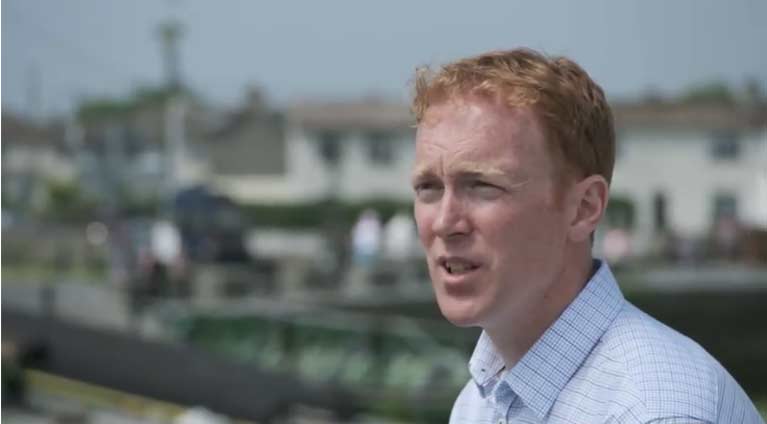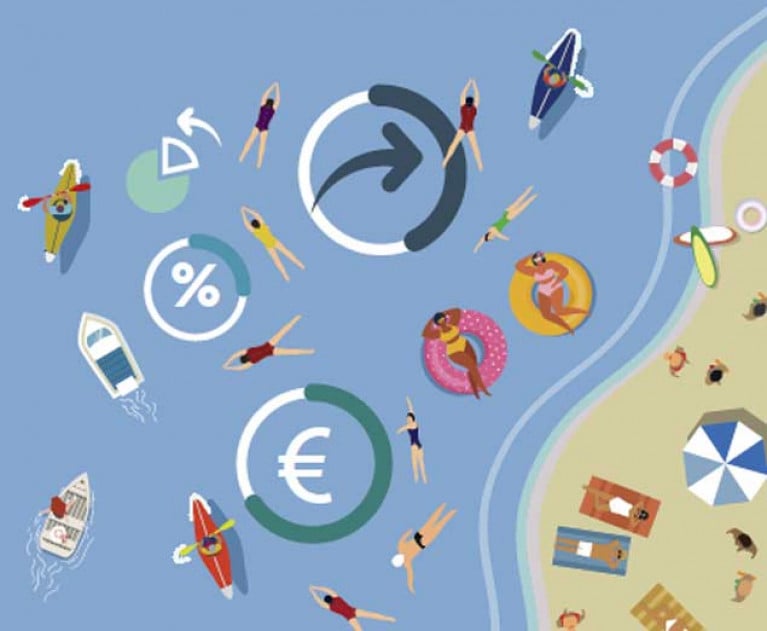Displaying items by tag: coastal tourism
Digital Innovation Project Could "Revolutionise" Coastal Tourism - Western Development Commission
Coastal tourism could be “revolutionised” by a new EU-funded project to improve the digital capabilities of the blue economy on the Atlantic seaboard, the Western Development Commission (WDC) says.
The WDC has announced details of the Digital Innovation in the Blue Economy to Support Tourism (DIBEST), valued at over two million euros.
"The west coast of Ireland is one of the maritime treasures on Europe's Atlantic seaboard. Enabling our small/medium enterprises (SMEs) to grow the associated marine tourism sector through the identification and adoption of best-in-class digital technologies is at the core of the DIBEST project,” Ian Brannigan, WDC's Head of Regional Development, states.
"The digital age has “shifted the business landscape"
“ This aligns with the Western Development Commission's strategic aim to connect our unique regional offerings—in terms of communities, coastline, and experiences—with global visitors. As such, the Western Development Commission is excited to work with national and international partners in bringing this initiative to fruition,” he said.
Tourism micro-SMEs have long been the backbone of the Atlantic Area's economy and culture, offering a diverse range of services from accommodation and food to tours and entertainment, the WDC says.
However, the digital age has “shifted the business landscape, often favouring larger enterprises”, it points out.
“For example, consider a tour operator without an online booking system, who relies solely on phone bookings. Such businesses are potentially losing out on customers to more digitally advanced providers who offer online booking capabilities. DIBEST aims to target this type of micro-SME and assist them in levelling the playing field,” it says.
“Drawing from insights gained from the Tourism 4.0 project, micro-SMEs have highlighted booking systems, revenue management software, and CRM solutions as the most crucial technological tools for their operations,” it says.
“Looking ahead, the most relevant technologies for future implementation are related to online sales, followed by data analysis, automation, and cybersecurity. DIBEST aims to address these specific needs, enhancing the digital competitiveness, market access, and environmental sustainability of Atlantic Area tourism micro-SMEs,” it says.
Over the course of DIBEST, a digital toolkit will be created, as well as a comprehensive training programme that emphasises shared learning, mentoring, and business matchmaking on digital transformation, innovation, and technologies, it explains.
It says that while the specifics of the toolkit are yet to be confirmed and will be shaped by initial scoping and training needs analysis; the project aims to create a holistic approach to digital empowerment.
“This aligns with WDC's ongoing campaign, 'Local Living, Global Opportunities,' positioning the western region of Ireland as a prime location for both sustainable and digitally advanced tourism,”it says.
The project is backed by a diverse consortium from Ireland, France, Portugal, and Spain, and will engage academic institutions, public bodies, and private organisations.
More details are here
Economic Assessment of South-East Galway Bay Finds it Supports 550 Jobs
A one-year economic assessment of the southeast Galway Bay catchment has found it generated revenues of €105 million and supported about 550 jobs.
The report was commissioned by Cuan Beo, a community based coastal organisation working in south-east Galway Bay, and is the first of its kind according to the group.
Its findings were presented at a regional event held late last week which was attended by local politicians and policymakers, representatives of State agencies, and farmers, fishermen, community and tourism groups, scientists and environmental groups living in the catchment.
The event was moderated by Dr Micheál Ó Cinnéide, former director of the Environmental Protection Agency and now with Corrib Beo.
The report describes how a very distinct geographical area is connected by a common drainage system, drawing all rainfall and run-off water in the catchment and discharging it into Galway Bay.
It is one of 46 catchments in Ireland, according to the EPA, and covers an area of approximately 1,200 Km2. It includes about 117 km of coastline stretching from Galway harbour to Blackhead in Co Clare and extends inland to Athenry, Loughrea and Gort.
The report highlights the value and importance of data collection and management for the catchment, and potential growth areas across a number of key sectors where the resources available in the catchment could be developed in a sustainable manner to create new jobs and generate revenue.
These growth areas include climate technology, blue health, marine and coastal tourism, research and local community development and the report says they offer “unparalleled opportunities for growth and sustainable development, building on the circular economy and supporting climate-resilient communities”.
“Now that we have established market and non-market economic baselines, this report will heighten awareness with policymakers and planners as to the true value of the resource base and the marine environment,” Cuan Beo chair Diarmuid Kelly said.
“ It will promote this catchment as a location for research and development in sustainability and environmental enhancement. This will become increasingly important as social and environmental measures, such as carbon emissions and sustainability development goals, are established and monitored,” he said.
The report was conducted by Dr Colm O’Dowd who noted that “valuing both market and non-market products and services from the marine environment is necessary if they are to be included in marine spatial planning and management decisions”.
“For example, while we know that shipping and tourism are vital economic pillars in this catchment, there is little awareness of the value of marine-related recreation or the potential healthcare savings associated with activities such as sea
swimming,” O’Dowd said.
“Assessing the economic value of these activities and of marine ecosystems should influence decision making on marine spatial planning and support improvements in water quality and access to coastal areas,” he said.
The report was funded by Cuan Beo, the Local Authority Waters Programme (LAWPRO) and the EU Maritime and Fisheries Fund under the FLAG West Programme.
A copy of the report is available here
Coastal & Marine Tourism Could Help "Reboot" Badly Hit Sector, NUI Galway Report Finds
Domestic coastal and marine tourism could help to “reboot” a sector which has been badly hit by the Covid-19 pandemic, a new report by NUI Galway (NUIG) finds.
“Marine-active” holidaymakers tend to stay longer and spend more than the average visitor, the study of domestic tourism by NUIG’s Socio-Economic Marine Research Unit (SEMRU) says.
Total expenditure by domestic tourists in coastal areas was estimated to be €698 million in 2018, which represents 35% of the total expenditure by domestic tourists that year, the study says.
The marine-related activity expenditure on overnight trips is estimated to have generated revenue of €381 million, with €172 million of this being spent on water-based activities.
The study found that average expenditure per coastal day trip in 2018 was €95, and the equivalent for coastal overnight trips was €310.
A survey for the study found that the most popular land-based coastal activities were walking/running along the coast/beach/cliffs/, beach or seaside trips, and coastal sightseeing.
The most popular water-based activities were sea swimming, surfing, recreational boating of different types and sea angling.
It notes that “significant differences in participation rates were observed across a number of socio-demographic classifications, including age, social class and education attainment levels”.
The results also indicate that domestic tourists undertake the majority of their marine activities on the west and south Irish coasts.
The authors argue that “given the observed differences in marine activity... across the social classes”, a “worthy policy objective would be ensuring that all sections of society can access.. the well-being and mental health benefits”.
. “Given the current crisis this is more important than ever,” the authors state.
“It also offers an opportunity to develop new marine tourism offerings focused on the expanding consumer demand for wellness services and products,” they state.
 Co-author of the report Dr Stephen Hynes
Co-author of the report Dr Stephen Hynes
Dr Stephen Hynes, director of SEMRU and co-author, said that while the results predate the impact of the current pandemic, they “highlight the economic contribution that domestic marine tourism and leisure activity makes under normal circumstances to coastal regions, particularly those regions outside the capital”.
“Also, given that it is likely that the overseas tourism market will take much longer to recover, and Irish residents’ travel abroad will also be curtailed, the industry should be examining how they can maximise the return from the domestic tourism market this year and next,” he said.
Commenting on the report, Prof Alan Ahearne of NUIG’s Whitaker Institute noted that the World Tourism Organisation is forecasting that international tourist arrivals could plunge 60-80% this year, and “may remain at depressed levels next year”.
“Tourism in Ireland will be looking to domestic demand for recovery - and the evidence points to the huge potential for coastal and marine tourism to contribute to rebooting activity in this sector,” Prof Ahearne said.
Download the full report from NUIG below as a PDF





























































